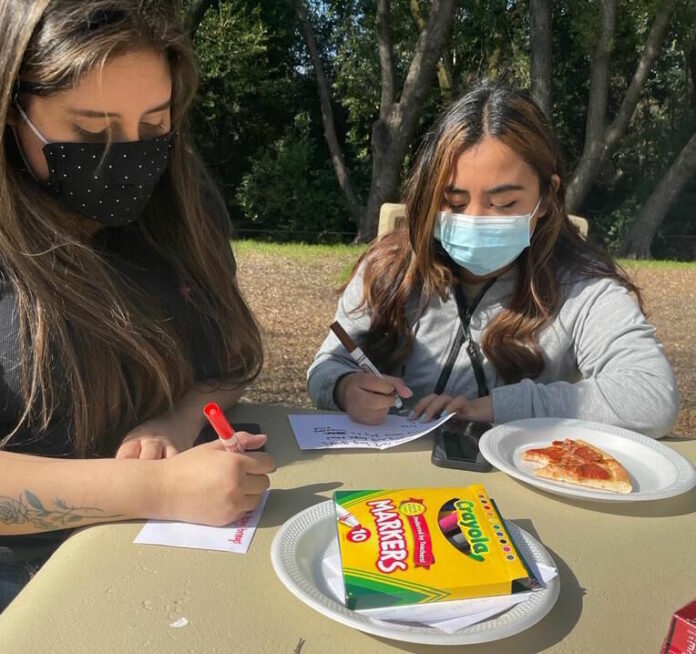Some members from Windsor High School Movimiento Estudiantil Chicano de Aztlán (MEChA) said that they had difficulty making friendships and finding peers with similar experiences as theirs before joining. Now, they have embraced helping their community with volunteer work while enhancing their Latinx culture simultaneously.
“I went to their booth at the club carnival one day and I read up on them. I decided this would be the best program to enter into to help out our community,” said Esperanza Marquez, a Windsor High School (WHS) junior who joined the club as a freshman. She’s now club president.
Marquez is also a part of a local Aztec dancing group and said that said everyone in her group has been a part of MEChA at some point.
Marquez said the club in Windsor focuses mainly on bettering the community and working with other MEChA organizations, “Throughout Sonoma County, we focus on doing food drives or voluntary work with the lower income families and making sure they’re taken care of,” she said. “They don’t have the resources that others do, so we try to support them in any way we can. Whether it be going out and giving care bags out to them or just volunteering.”
The club focuses on Chicano education as well, and was originally founded to get education rights for Chicanos during the Chicano movement and the sentiment prevails.
One of the main goals for this school year is expanding MEChA to other schools in the Windsor Unified School District. Marquez said other districts around Sonoma County have middle or elementary school clubs, “But the Windsor MEChA club hasn’t really done anything with the Windsor Middle School or Cali Calmecac Language Academy,” she said.
For her, being a part of the club has allowed her to get a better understanding of her culture.
“Because some people don’t know how their grandparents or what their family went through. I think the club would really help bring this into perspective. It also brings a sense of community around schools,” she said.
“I didn’t really have many friends at the high school when I first joined. But with MEChA, it gave me another community to be able to share experiences with. You grow with them. You grow individually, but you get to know them. I think that’s very important at a young age to be able to make those connections with people and those connections will stick,” she said.
Marquez said the club is always accepting new members and takes everyone’s opinion into account.
“We work together to better the community in every way possible. We try to keep that tradition going from, you know, the 1960s when the Chicano movement was still happening with Cesar Chavez and Dolores Huerta,” she said.
“I think that is seen as, ‘Oh, it’s a Chicano club. I have to be able to speak Spanish or I have to grow up in that community’ — but I don’t think that’s what it really is. We help the community as a whole and not just one specific area,” Marquez said.
Junior Amelia Ohler, vice president of MEChA, said that she joined the club because she wanted to make new friends.
“It’s honestly been very life changing. I feel like I’ve had a lot of experiences that have changed my perspective in life and have made me more of an adaptive person and also a more empathetic person,” Ohler said. “I think it’s really made me see how our people are treated, because in Windsor, it’s kind of in your own bubble. But when you see other communities you understand.”
Being a part of the club has also reinforced for Ohler the idea of following a further education and making a difference in communities.
Ohler has participated in creating homeless care bags, creating informational presentations and diaper distributions. She also did phone banking for a proposition for schools to receive more money.
“We just have really strong bonds. I think we all come together for everybody. When you’re volunteering, like, your heart opens up, you have more empathy, because it’s like, ‘What if I was in this situation?’ I would definitely want somebody to help me out,” she said.
“I feel like with MEChA you see other schools clubs, you have more of an outreach to the community. I feel like that’s what’s really important about it because we’re just connected to mostly everybody, and we’re honestly just trying to see what the community needs and trying to support that,” Ohler said.








